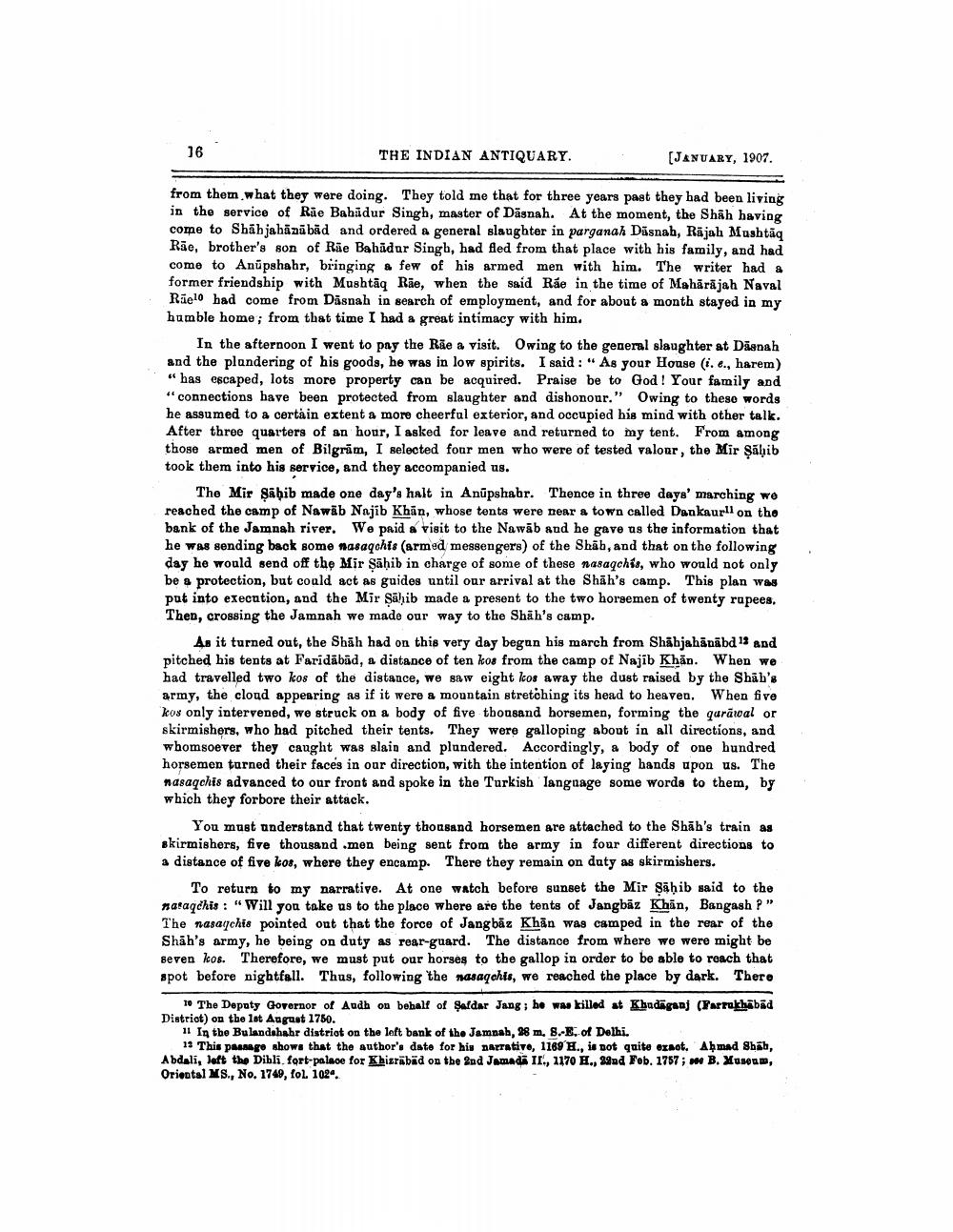________________
THE INDIAN ANTIQUARY.
(JANUARY, 1907.
from them what they were doing. They told me that for three years past they had been living in the service of Rue Bahadur Singh, master of Däsnah. At the moment, the Shah having come to Shāhjahāzābād and ordered a general slaughter in parganah Däsnah, Rajah Mushtāq Räe, brother's son of Rãe Bahadur Singh, had fled from that place with his family, and had come to Anūpshahr, bringing a few of his armed men with him. The writer had a former friendship with Mushtaq Rāe, when the said Ráe in the time of Mahārājah Naval Rãelo had come from Däsnah in search of employment, and for about a month stayed in my humble home; from that time I had a great intimacy with him.
In the afternoon I went to pay the Rãe a visit. Owing to the general slaughter at Daanah and the plundering of his goods, he was in low spirits. I said: "As your House (i. e., harem) " has escaped, lots more property can be acquired. Praise be to God! Your family and “connections have been protected from slaughter and dishonour." Owing to these words he assumed to a certain extent a more cheerful exterior, and occupied his mind with other talk. After three quarters of an hour, I asked for leave and returned to my tent. From among those armed men of Bilgrim, I selected four men who were of tested valour, the Mir şahib took them into his service, and they accompanied us.
The Mir Sahib made one day's halt in Anūpshabr. Thence in three days' marching we reached the camp of Nawab Najib Khan, whose tents were near a town called Dankaupll on the bank of the Jamnah river. We paid a visit to the Nawāb and he gave us the information that he was sending back some nasaqchis (armed messengers) of the Shah, and that on the following day he would send off the Mir Şahib in charge of some of these nasaqchis, who would not only be a protection, but could act as guides until our arrival at the Shāh's camp. This plan was put into execution, and the Mir Sāhib made a present to the two horsemen of twenty rapees. Then, crossing the Jamnah we made our way to the Shah's camp.
As it turned out, the Shāh had on this very day began his march from Shahjahänäbd 1 and pitched his tents at Faridabad, a distance of ten kos from the camp of Najib Khăn. When we had travelled two kos of the distance, we saw eight kos away the dust raised by the Shāb's army, the cloud appearing as if it were a mountain stretching its head to heaven. When five kos only intervened, we struck on a body of five thousand horsemen, forming the qurāral or skirmishers, who had pitched their tents. They were galloping about in all directions, and whomsoever they caught was slain and plundered. Accordingly, a body of one hundred horsemen turned their faces in our direction, with the intention of laging hands upon us. The nasaqchis advanced to our front and spoke in the Turkish language some words to them, by which they forbore their attack.
You must understand that twenty thousand horsemen are attached to the Shāh's train as skirmishers, five thousand .men being sent from the army in four different directions to a distance of five kos, where they encamp. There they remain on duty as skirmishers.
To return to my narrative. At one watch before sunset the Mir şahib said to the naraqchis: "Will you take us to the place where are the tents of Jangbāz Khan, Bangash ?" The nasaqchis pointed out that the force of Jang bāz Khān was camped in the rear of the Shah's army, he being on duty as rear-guard. The distance from where we were might be seven kos. Therefore, we must put our horses to the gallop in order to be able to reach that spot before nightfall. Thus, following the nasaqchis, we reached the place by dark. There
10 The Deputy Governor of Audh on behalf of Şafdar Jang: he was killed at Ebadäganj (Farrukhabad District) on the 1st August 1750.
11 In the Bulandshahr distriot on the left bank of the Jamnah, 28 m. 8.-E. of Delhi.
13 This page shows that the author's date for his narrative, 1169 H., 1. Dot quite exact. Ahmad Shab, Abdali, Jatt the Dibli, fort-palace for Khiträbäd on the 2nd Jamada II, 1170 H., 2nd Feb. 1757 ; " B. Xuseum, Oriental MS., No. 1749, fol 102".




